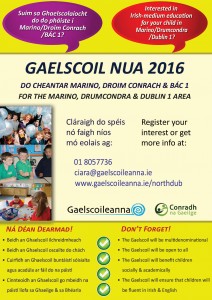(Gaeilge) Folúntas: Príomhoide Bhunscoil Bheanna Boirche, Caisleán Uidhlín
September 23, 2015
(Gaeilge) Folúntas: Gaelscoil Bhríde, Tiobraid Árann
September 23, 2015
(Gaeilge) Folúntas: Gaelscoil Uí Chéadaigh, Cill Mhantáin
September 23, 2015
(Gaeilge) Folúntas: Scoil an tSeachtar Laoch, Baile Átha Cliath
September 23, 2015
Bilingualism and Special Needs
September 22, 2015
The third in our series on bilingualism by Millie Slavidou deals with bilingualism and special needs. If you missed the first two parts, you can find them here – 7 Reasons to Bring up Your Kids Bilingual and Supporting Bilingualism in Tweens and Teens.
Parents of children with special needs frequently find they need to grow a thick skin to deal with all the ignorance and comments directed at them, and this is especially true in a bilingual family. As a mother of a child with special needs myself, bringing him up in a bilingual family has been a challenge. I have been accused of deliberately trying to sabotage his development through speaking my own language to him!
Even health care professionals can be incredibly negative about bilingualism, and it is very common for speech and language therapists to advise parents to use only one language at home. On one memorable occasion, my son’s case worker at the Centre for Mental Health told me that she would refuse to refer my son for speech therapy if I insisted on speaking a second language to him. “Speech and language therapy,” she declared, “can only be done in one language.” Of course, I requested a new case worker. Child psychologists are also frequently known to be against the idea of speaking more than one language at home.
So why do I persist in doing so? Well, there is no reason not to speak two languages to a person who happens to have special needs.
International studies have shown only benefits and not drawbacks to the use of two languages, and children with various conditions, such as Down’s syndrome, autism, and developmental and cognitive delays have been shown to be able to cope with more than one language. Not only do they cope, but research suggests that the stimulation offered by a second language can help children with special needs to function better. They are not learning them as foreign languages, which is a very different matter, but being brought up speaking both from birth.
If this is the case, you might wonder, then why the negativity from professionals towards bilingualism? Such matters are rarely simple. Firstly, research does not always reach the people on the ground for a long time after it has been carried out, and some professionals may have studied and been trained at a time when it was standard practice to discourage bilingualism. Secondly, those people may have little experience of bilingualism themselves, and unfortunately, they may extrapolate from their monolingual difficulties in learning a foreign language as an adult and apply that to the very different situation of bilingualism from birth – two native tongues.
Many researchers have suggested that bilingualism may even boost the cognitive abilities of children with learning disabilities and cognitive delays. So why would I limit and restrict my child by depriving him of one of his languages?
Interestingly, although in our own case my son has a limited active vocabulary, the words that he does use are words for the same thing in either language, which means that both his languages are progressing at the same rate. The same is true of his passive vocabulary, the things that he understands and responds to but does not actively use himself are the same things in both languages.
(Gaeilge) Folúntas leis an CNCM: Oifigeach Oideachais do Theanga sa Bhunscoil: Gaeilge
September 22, 2015
Information evening on proposed new Irish-medium primary school for North Dublin
September 22, 2015
Are you interested in a new multi-denominational Irish-medium primary school for the Marino/Drumcondra/Dublin 1 area? A new primary school is to open in this area in September 2016 and Gaelscoileanna Teo. are supporting an application by An Foras Pátrúnachta to have the new school designated as an Irish-medium school. More information can be found here
We are holding an information night in St Patrick’s College, Drumcondra, on the 30th of September at 20.00 to provide further information on the campaign, share more information on Irish-medium education and its advantages, and answer any questions parents may have. Guest speakers on the night include:
- Clodagh Ní Mhaoilchiaráin, Principal of Gaelscoil Bhaile Brigín
- Parents speaking about their experience of the Irish-medium education system
- A representative of An Foras Pátrúnachta
- A representative of Gaelscoileanna Teo.
Achieving Leadership Excellence In Your School
September 22, 2015
An in-depth workshop covering Leadership for Learning and Management Skills for School Leaders and Managers.
Further information here
Adventure weekend for Irish speaking families
September 22, 2015
Glór na nGael is organising a Halloween adventure weekend for families at
Carlingford Adventure Centre in County Louth on Friday and Saturday 23 October and 24 October 2015.
There will be story telling on the Friday night. Daytime activities on the Saturday will include zip wire, high ropes, orienteering and laser combat. Activities will also be provided for children too young to take part in the above adventure activities. It weekend will cost €45 per person, young or old. This cost will cover accommodation on the Friday night, breakfast, lunch and participation in all the events.
Glór na nGael will be organising a series of story-telling events across the country for Irish speaking families during the Halloween period. Details of the other events will be released as arrangements get finalised
Families interested in taking part in the event should contact Glór na nGael before the end of September. Further information is available from Glór na nGael in marcas@glornangael.ie or by phone on +353 86 171 9755.
(Gaeilge) Ionadaí ag teastáil chun Gaeilge a mhúineadh
September 22, 2015





